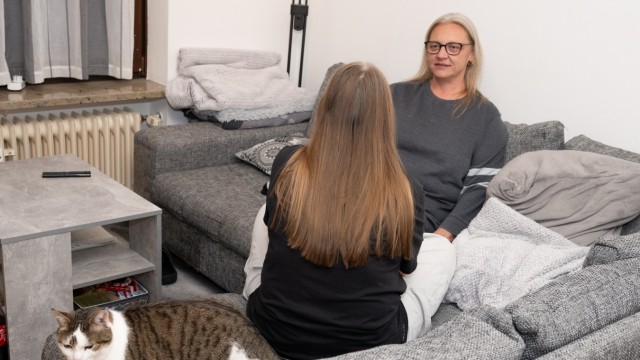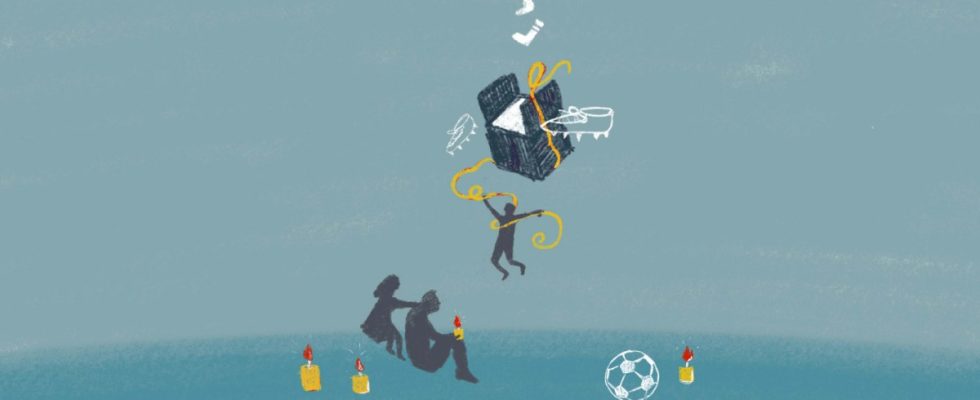Poverty can isolate and make you sick.
(Photo: Jessy Asmus)
From Monday to Friday, Lena’s night ends at five o’clock. Half an hour later her mother leaves the house and then there is no one left to wake her up in time for the first lesson. “It doesn’t matter,” says the girl with long blonde hair quietly, “I’ll clean up a bit, what others do in the evening.” Four years ago, the eighth-grader’s father died of cancer, and almost three years ago her brother moved into a youth welfare group in the Allgäu with a severe ADHD diagnosis and care level II.
To make ends meet, her mom, Manuela S., took on two jobs. As a warehouse worker, she leaves the apartment at 5:30 a.m. She also has a sales job twice a week, which adds up to 45 hours of work per week. “That’s okay. So at the end of the month we still have something in the fridge and all the bills are paid,” says Manuela S. The 46-year-old is a woman who can laugh courageously. And now she laughs: “We don’t need any government support!”
At the end of 2022, 265,600 Munich residents were considered at risk of poverty. That’s 17 percent of the urban population. “For children, the risk of poverty depends on the risk of poverty of their parents,” says a spokeswoman for the social department. 19 percent of households with children are affected, which means 46,800 of the more than 247,000 minors living in Munich. For single-parent families the rate is 37 percent, twice as high as for families as a whole.
Even when Manuela S. was not yet a single parent and was responsible for the family income together with her husband, life was no picnic. “We were never rich and never took vacations, but we made ends meet well.” This is also because they live in a cooperative apartment, three rooms, 74 square meters, rent for 941 euros. “I’ll never get anything like that again in Munich.” The 46-year-old strokes Fritz, who is stretched out on the large anthracite-colored corner of the couch next to mother and daughter, over his tabby fur. Two of his cat siblings have lived with him in the family for eight years. “Yes,” says Manuela S., “the cats also cost money.”

“I’ll never get anything like that again in Munich”: Manuela S. with her daughter Lena and cat Fritz are happy about their cooperative apartment.
(Photo: Catherina Hess)
But the cats also keep Lena company at the crack of dawn and they are a connection to the past, when her dad was still healthy and the family was complete. “My daughter was at home a lot when my husband got sick, then Corona started.” Lena glances at her mother, tears making their way down her cheeks. The 13-year-old gets up and walks out of the living room. Manuela S. looks after her. “I wasn’t there, her brother wasn’t there, she was sad and withdrawn.” Because the family budget no longer allowed it, her grandparents, who live next door, bought Lena a cell phone for online lessons. Back then her window looked outside.
Including widow’s pension and child benefit, Manuela S. has a good 2,800 euros in monthly income. After the start of the Ukraine war, additional costs shot up. “The electricity bill has doubled,” says the Munich woman, “140 euros more in additional costs per month, everything was no longer enough.” For Lena that meant: no more cinema, no more buying a snack at school, her mother now cuts her hair.
The widow has found that many friendships with children do not develop when money is tight at home. “It isolates children.” They themselves went for walks together, “that doesn’t cost anything.” What helped her daughter go back to school after the Corona shutdowns. “She has girls around her who feel the same way. There are many, many more people who have little than the other way around.”
According to an analysis by the Bertelsmann Foundation from January 2023, one in five children under the age of 18 in Germany is at risk of poverty. For two thirds this is a permanent situation. “Young people who grow up in poverty suffer daily from lack, sacrifice and shame and have significantly worse prospects for the future,” says the study. These children often do not have a computer with internet, are less likely to be members of a club, and have to submit stigmatizing applications to teachers or trainers for school trips or leisure activities. They wouldn’t be able to get out of their own world. Many are hiding.
Lena has now returned almost unnoticed to the living room, where her mother set up her own bed next to the couch some time ago. She wanted to create space so that each of the children had their own room, a place to retreat. The 15-year-old son always comes home on weekends and holidays. “After my husband’s death, it was very difficult for him,” says Manuela S. “He is now making great progress in the facility and we hope that he will graduate from special school and then be able to come back to us and start an apprenticeship here.”
The family is gathered again at Christmas. “I make sure that I put something aside every month so that I can buy something for the children, they want something too.” Grandma, grandpa and aunt also contribute something, says the 46-year-old. Grandparents are a great source of support, including financial support. When the washing machine and refrigerator recently broke down, they advanced the money to their daughter. What the widow and her children urgently need, but foreseeably cannot afford themselves: a new bed for their son, a coffee machine. And Lena? The 13-year-old pulls the sleeve of the light gray sweater with one hand over the other hand. The eyes fill with tears again. She gently raises her shoulders. “What turquoise blue, my favorite color, for the room?” The child is not practiced in wishing.
Here’s how you can donate: “Advent calendar for good works from the Süddeutsche Zeitung eV” Stadtsparkasse München IBAN: DE86 7015 0000 0000 6007 00 BIC: SSKMDEMMXXX

